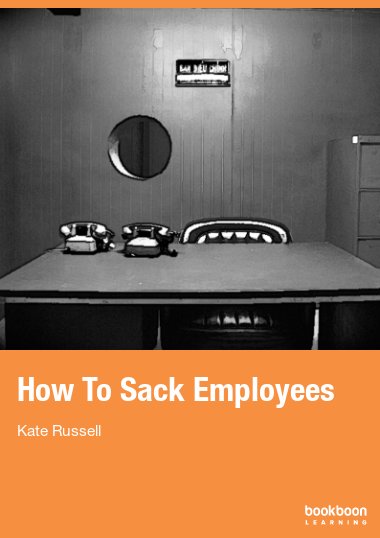If you manage employees, from time to time discipline and dismissal will be an inevitable part of your work. Employers are under a duty to follow their procedures, make a decision that is sensible and proportionate on the facts and take all mitigating circumstances into account. Applications to tribunal have increased significantly in recent years and going to tribunal is always tough, even when you are absolutely in the right. Using real life examples, this book talks the reader through the legal framework, best practice, tactics and how to prevent getting into difficulty in the first place.

If you manage employees, from time to time discipline and dismissal will be an inevitable part of your work. Employers are under a duty to follow their procedures, make a decision that is sensible and proportionate on the facts and take all mitigating circumstances into account.
Applications to tribunal have increased significantly in recent years. Below is a list of the mistakes that most frequently lead to a finding of unfair dismissal against employers.
- The employee was not given the opportunity to defend himself or put forward his side of the story.
- The employee was not made aware of all of the evidence against him.
- There was no disciplinary hearing.
- The investigation of the alleged misconduct or shortcomings was inadequate.
- An earlier ‘warning’ was not made explicit.
- The disciplinary procedure was not applied in full.
- The procedure used did not follow the employer’s own rules.
- The employer chose not to have a procedure at all for more senior staff and managers.
- The employee was not given a reasonable opportunity to improve performance or conduct.
- Insufficient investigation of the medical background in dismissals on grounds of ill health.
- The employee had not been given an opportunity to comment on medical evidence in a case of ill-health dismissal.
It would be fair to say that these days employers face an increased risk of tribunal claims. While many claims are quite legitimate, there is a significant minority who will put in a claim because they feel wronged (irrespective of the merits of the case) or simply for the hell of it. As managers we need to manage effectively, taking such risks into account. As well as being compliant and fair, we need to be tactical as well.
Follow the guidance given in this book and you will be able to take an employee through the disciplinary procedure, to dismissal if necessary and massively reduce the risk of a tribunal claim.
- Preface
- About the author
- Miscellaneous notes
- Overview of the ebook
- Introduction
- The legal framework
- The reasonable employer
- Standards and rules
- Capability and conduct
- First steps
- The investigation
- Preparation for a disciplinary hearing
- Handling the disciplinary hearing
- Sanctions
- Appeals
- Protected conversations
- Grievances raised during the discipline process
- The legal framework
- Introduction
- ACAS Code of Practice 1
- ACAS: fairness
- ACAS: disciplinary process
- ACAS Guidance
- Right to be accompanied
- Legal representation
- The reasonable employer
- Introduction
- Characteristics of the reasonable employer
- Note taking
- Standards and rules
- Introduction
- Standards
- Rules
- Capability and conduct
- Introduction
- Capability (‘Can’t’)
- Qualification
- Poor work performance
- Ill health
- Conduct (Won’t’)
- First steps
- Introduction
- How to handle an informal discussion
- Informal v formal discussions
- Tips
- The investigation
- Introduction
- How to carry out an investigation
- Investigation checklist
- What happens when the facts are not in dispute?
- Witnesses
- Anonymous witnesses
- Burden of proof
- Suspension
- Preparation for a disciplinary hearing
- Introduction
- Preparing to chair the hearing
- Right to be accompanied
- Companion not available
- Employee with short service
- Chairing the disciplinary hearing
- Introduction
- Disciplinary hearing checklist
- Employee’s failure to attend
- Possible pitfall
- Sanctions
- Introduction
- Is the sanction a ‘reasonable response’?
- Make the right to dismiss very clear
- Factors to consider in reaching a decision
- Totting up
- Expired warnings
- Formal warnings
- Date of dismissal
- Dismissal by letter
- Improvement
- Appeals
- Introduction
- Appeal procedure
- Review v re-hearing
- Hearing an appeal
- Outcome
- Protected conversations
- Introduction
- What is meant by ‘protected conversation’?
- Limits on protected conversations
- Conducting pre-termination negotiations
- Grievances raised during the discipline process
- Introduction
- Overlapping discipline and grievances
- Managing difficult grievances
